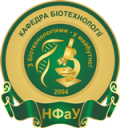DIRECTIONS OF SCIENTIFIC RESEARCH
DEPARTMENTS OF BIOTECHNOLOGY
2020-2021
DEVELOPMENT OF COMPOSITION, TECHNOLOGIES AND BIOPHARMACEUTICAL RESEARCH OF MEDICINES ON THE BASIS OF NATURAL AND SYNTHETIC RAW MATERIALS
(№ state registration 0114U000945)
1.1 Scientific topic of the department “Development of the composition and technology of immunobiological drugs for the prevention and treatment of candidal infections” (Assoc. Prof. Rybalkin MV, Prof. Strelnikov LS)
1.2 Scientific topic of the department “Development of the composition and technology of drugs based on probiotics”
(Assistant Professor Solovyova AV, Assoc. Prof. Kalyuzhnaya OS)
1.3 Scientific topic of the department “Development of the composition and technology of the drug
on the basis of antifungals and interferons for the treatment of candidiasis “(assistant Demidova IV, Assoc. Prof. Rybalkin MV)
1.4 Agreement on scientific cooperation “Determination of features of reproductive disorders induced by neonatally or local hyperthermia, and the possibility of their pharmacological correction using thiazolinilamide camphoric acid” and the scientific topic of the department ., Prof. Sagittarius OP)
1.5Agreement on research cooperation “The use of porous materials for filtration processes in various fields of biotechnology” and the research topic of the department “Study of the possibility of using fluoroplastic porous filter elements in biotechnology” (Assoc. Prof. Kalyuzhnaya OS)
1.6 Scientific topic of the department “Study of biological stability of dosage forms” (Prof. Strelets OP, Prof. Strelnikov LS)
1.7 Scientific topic of the department “Substantiation of the composition and technology of emulsion-based ointments for the treatment of erysipelas” (Assoc. Prof. Azarenko YM)
1.8 Scientific topic of the department “Substantiation of the composition and technology of mild dosage form for the treatment of insect allergies” (Head of the Department, Prof. Khokhlenkova NV)
DEVELOPMENT OF THE COMPOSITION AND TECHNOLOGY OF DIETARY SUPPLEMENTS
(№ state registration 0114U000955)
2.1 Scientific topic of the department “Development of composition and technology of functional foods”
(Assoc. Prof. Kalyuzhnaya OS)
2.2 Scientific topic of the department “Development of the composition and technology of dietary supplements based on probiotic cultures and natural components” (Assoc. Prof. Dvinsky NV)
SPECIFIC SCIENTIFIC DIRECTIONS OF THE DEPARTMENT OF BIOTECHNOLOGY
3.1.Scientific topic of the department “Research of antimicrobial properties of plant objects” (Prof. Strelnikov LS)
3.2.Scientific theme of the department “The use of Parameciumcaudatum as a test object in the study of biological properties of new pharmaceutical phytocompositions” (Prof. OP Strelets)
Students can work in any scientific field of the Department of Biotechnology:
Development of composition and technologies of new pharmaceutical drugs and improvement of existing drugs of different directions of action both of synthetic origin and on the basis of biotechnological objects (creation of new combined antihypertensive drugs in tablet form; dosage form of cathiazine for correction of spermatopathies; etc)
Study of biological properties of probiotics, bacteriophages in order to create modern biotechnological drugs of domestic production in the framework of import substitution
Development and improvement of methods of BAS biosynthesis (improvement of citric acid biosynthesis; study of sea fungi for the presence of BAS, which can be used in the future in the development of drugs)
Development of immunobiological drugs based on Candidaalbicans fungi
Development and improvement of nutrient media for the cultivation of strains producing microorganisms (for the production of drugs, food and feed additives, fertilizers, as well as for the accumulation of BAS)
Development of composition and technologies of functional foods with dietary and therapeutic and prophylactic properties
Environmental technologies (improvement of biological wastewater treatment methods)
Quality assessment of food products (sour milk, beer, wine, etc.)
Hygienic assessment of environmental objects (water from various sources of water supply, indoor air, etc.)


